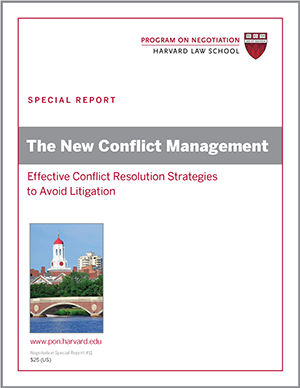
Some of our most heated negotiations and disputes involve value conflict over our core values, such as our personal moral standards, our religious and political beliefs, and our family’s welfare.
Consider these value conflict examples:
- Business partners clash over the ethical standards they expect each other to uphold.
- A negotiator refuses to do business with a potential counterpart she deems unsavory on moral grounds.
- Parents bar their teenager from attending an event they think might be dangerous.
These types of value conflict, which highlight our norms, beliefs, and identities, can be incredibly difficult to resolve. When our most deeply held beliefs and principles are at stake, we often ratchet up value conflict out of a desire to be heard, refuse to make any concession that would appear to compromise our values, or categorically refuse to negotiate. Drawing on new research, we present three strategies for negotiating value-based conflict.
1. Assess Whether the Value Is Truly Sacred
Value conflict often arises because one or more of the parties involved consider a value to be sacred and nonnegotiable. In some cases, our values truly are sacred and not open to compromise. In other situations, however, our values turn out to be “pseudo-sacred”—that is, we are willing to negotiate them under certain conditions, notes Harvard Business School professor Max H. Bazerman.
For example, in one study, negotiators with little power were more likely to compromise on a seemingly sacred issue than were negotiators with greater power, Notre Dame University professor Ann E. Tenbrunsel and her colleagues found in their research. A lack of alternatives led low-power negotiators to become more flexible.
Before refusing to budge on an issue you deem sacred, try to envision an outcome that would allow you to abide by the spirit of your values even as you make concessions on the specifics. Similarly, if a counterpart insists a particular issue is sacred, you might make a proposal that honors their values while also bringing you closer to agreement.
This doesn’t mean putting price tags on your most cherished beliefs; rather, it means thinking creatively about how to meet broader goals. Imagine, for example, that you adamantly oppose your sibling’s intention to sell some of your late parents’ possessions. But what if you donated your share of the proceeds from the sale to a charity your parents supported? You might prefer this outcome and avoid a protracted value conflict.
2. Offer a Concession on a Core Value
You may be able to induce cooperation from a reluctant counterpart in a value conflict by making a difficult but symbolic concession on a key principle.
In a 2007 study, Jeremy Ginges of the New School for Social Research and his team presented various proposals for resolving the Palestinian-Israeli conflict to citizens residing in the West Bank and Gaza: Jewish-Israeli settlers, Palestinian refugees, and Palestinian student supporters of Hamas. All three groups rejected proposals that would require their group to make a concession on a core issue in exchange for peace. And when each side was also offered significant economic aid, they were repulsed by the idea of trading their sacred values for cash.
However, when asked whether they would accept the peace deal if accompanied by a significant concession from the opposing side on one of its sacred values, all three groups became willing to negotiate. The Israeli settlers agreed to make concessions if Hamas accepted Israel’s right to exist. The Palestinian refugees grew more flexible if Israelis would relinquish their claim to the West Bank. And the Palestinian students became ready to bargain if the Israelis were willing to officially apologize for Palestinian suffering in the conflict.
When sacred values are at stake, we are likely to be offended by the suggestion that our support can be “bought.” Proposing a meaningful sacrifice on one of your own core values may demonstrate your seriousness, inspire reciprocation, and avoid a value conflict.
3. Affirm the Other Side’s Positive Qualities
In a value conflict, thinking about qualities you appreciate in your counterpart, such as trustworthiness or deep convictions, can help parties create value, researchers Fieke Harinck of Leiden University in the Netherlands and Daniel Druckman of George Mason University found in their research.
This result dovetails with findings from University of California at Los Angeles professor Corinne Bendersky showing that negotiators can soften their counterpart’s firm stance on a seemingly sacred value by making statements that affirm the counterpart’s status, such as “I have a lot of respect for people like you who stand by their principles.” It seems an opponent’s affirmation of our status buffers us against the identity threat we’d suffer if we compromised on a core issue and makes us more open to value creation in the process.
What other strategies have you found to be effective in resolving value conflict?




